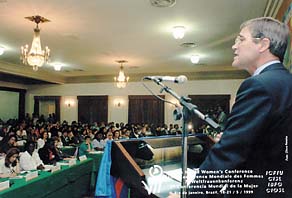|
Photo: Bill Jordan, ICFTU General Secretary welcomed the delegates at the opening ceremony.
 The
7th ICFTU World Women's Conference took place in Rio de Janeiro, Brazil
from May 18-21. 320 delegates from 87 countries gathered to discuss
the conference theme, "Women in the 21st Century: Demanding Our
Space, Taking our Place." The
7th ICFTU World Women's Conference took place in Rio de Janeiro, Brazil
from May 18-21. 320 delegates from 87 countries gathered to discuss
the conference theme, "Women in the 21st Century: Demanding Our
Space, Taking our Place."
RENGO Vice General Secretary Kumazaki was the head of a Japanese delegate party of nine, that attended and spoke at the plenary session and workshops.
At the opening ceremony, General Secretary Bill Jordan gave a speech on behalf of the organizers. "ICFTU celebrates its 50th anniversary this year. We selected women as the theme for our very last event of this century. We hope we can work side by side toward sexual equality. Issues facing women will continue to be ever more challenging in the future. In order to cope with this, we want to make sexual equality a priority item and in order to do so we need more women in the trade unions. In the Trade Union Movement, the more we push for sexual equality in every field, and the more we fight for it, the more results we will see. We place a high value on solidarity. Let women raise their voices loudly at this conference. Through men and women working side by side, we will be able to find the true strength of trade union's."
Nancy Riche, chair of the ICFTU Women's Committee spoke next. "This conference is a historic event for women unionists. You must realize that you are not the only ones who are attending here today. Close your eyes and think of the people you left behind in your countries. Your mothers, daughters, people you have met, people who have helped youcall of them are here with you. We stand ready to enter a new millenium, and yet conditions for women have not improved. Globalization or liberalization is bad for workers, especially women, and free trade is not gender-neutral. At this conference, we will exchange opinions, make plans for improvement and then we will create a women's network. Let us also continue to push forward in the future for higher posts."
A panel discussion entitled "Transforming the Global Market through Equality and Justice" was then held with RENGO Vice General Secretary Kumazaki as chair, followed by a videotape in five official languages prepared by RENGO entitled "Change the World through Gender Equality" which received applause from the audience.
Panel discussions and workshops were held from the second day on the themes "Effective Organizing," "Women's Solidarity: a Dynamic Force in the Trade Union and in Society," "Taking Our Place in the 21st Century: Equality for All." The Japanese delegation divided into two groups and participated in the workshops. Some of the main issues discussed at this conference were plans to create guidelines for policies relating to women, strategies to organize women into trade unions (especially encouraging the participation of young women workers in the union), and solutions for the abolition of all kinds of discrimination (age, physical disabilities, sexual preference, etc.).
The four-day conference came to a close with the issuing of the "Resolution Regarding Women and Armed Conflicts." In addition, the "Conclusion and Proposal" was adopted and will be formally presented to the ICFTU's 17th World Congress which will take place in April 2000. |